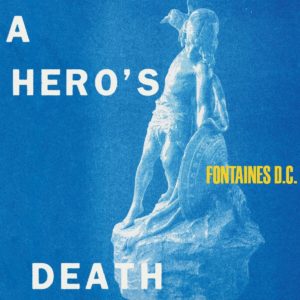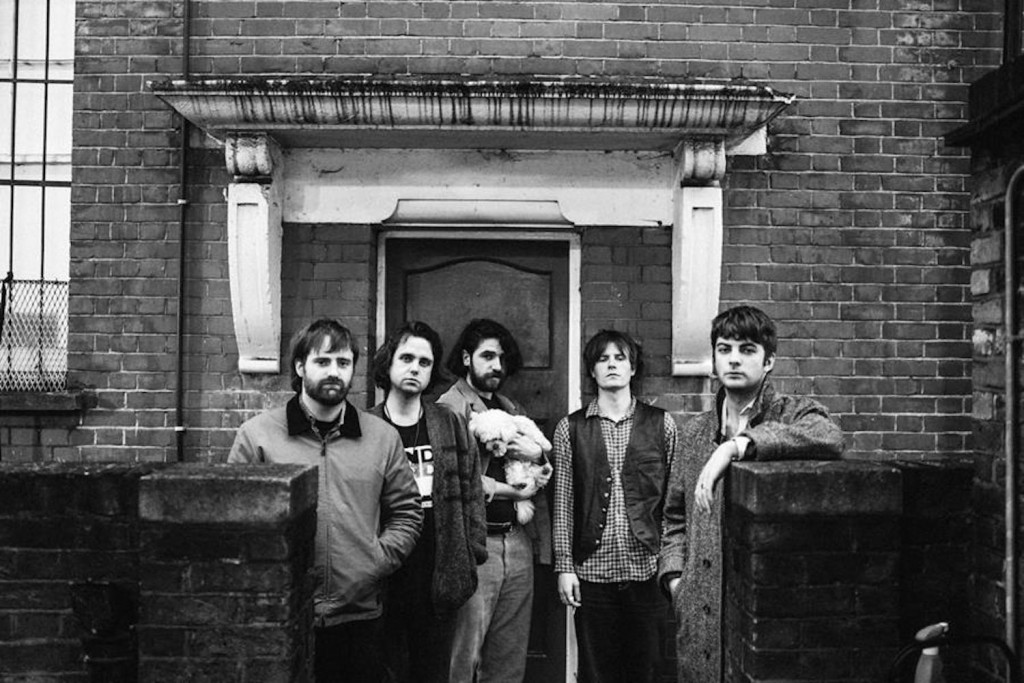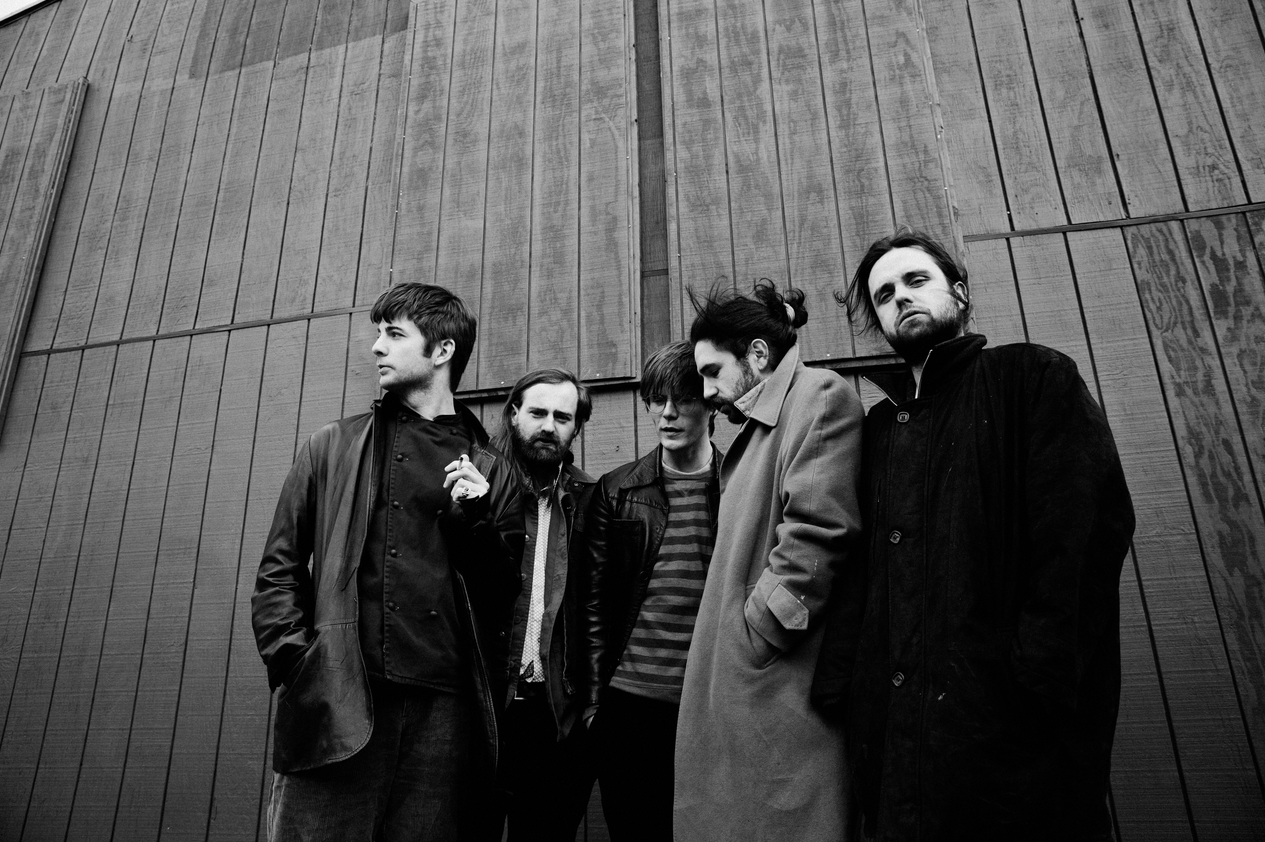Foto-© Daniel Topete
Mit ihrem zweiten Album A Hero’s Death unternimmt die Dubliner Post-Punk-Formation Fontaines D.C. nicht weniger als den großen Bruch mit dem, was sie sich seit ihrem gefeierten 2019 erschienenen Debüt Dogrel mühsam aufgebaut haben. Geblieben sind lärmende Gitarrenriffs und die fiebrige Performance von Frontmann Grian Chatten, immer schwebend auf dem schmalen Grat zwischen angsterfülltem Ausdruck und unkontrollierter Ekstase. „I don’t belong to anyone / I don’t want to belong to anyone“, hallt es aus dem Opener der Platte heraus. Und das ist auch der Anspruch, den die irische Band inbrünstig zum Credo erhebt. Der Sound ist empfindlicher und breiter geworden, die Texte nachdenklicher, nach innen gerichtet – und der Ton ist einer, der aus den Tiefen der gründlichen Reflexion über Ängste und Verwirrungen zu uns hinaus schallt.
Vor der Veröffentlichung von A Hero’s Death haben wir uns auf ein Gespräch mit Gitarrist Carlos O’Connell getroffen und zu den literarisch-lyrischen Wurzeln der Band befragt, über den neuen inneren Fokus gesprochen. Er berichtet außerdem, wie die Band sich von dem Erfolg des Erstwerks und von der daran gekoppelten Außenwahrnehmung lösen musste, um mit A Hero’s Death einen würdigen Nachfolger zu erschaffen. Auch, oder vielleicht gerade mit einem Blick in den Abgrund gibt es Hoffnung auf neues Licht, so O’Connell. Die Demontage des eigenen Erfolgs – das ist ein Grundrezept des energischen Zweitwerks, welches zeigt, dass der Prozess der Zerstörung dem Erschaffen von neuer Kunst oft unmittelbar vorausgeht.

Congratulations on the upcoming release of your new album A Hero’s Death! What’s on your mind right now?
I feel really good about it all. It’s all coming together now and there has actually been a bit of a response to the record. Everything is going really positive and we’re happy with how things are going. I think I’m adapting to this new situation that we’re in. I’m happy to be pulling out a record during this time. There’s no shows, no touring, and everything like that. So I’m happy that we can at least have that as a relation with the world through our music.
How does it feel to drop an album right in the middle of a worldwide pandemic? Would you also rather release it in a different context, where you can have more promotion, and actual concerts?
Now it feels right. I think we all had enough time to adapt to the situation. I am okay right now. You can’t just put everything on pause like that, you have to accept the state of things as they are currently. And I think that’s what we do on this record. It would be quite pointless to wait until things are slightly „better“, if they ever will be, to wait until things turn back the way they were before, the way we were used to. If we waited to come back with another record, we just would be missing out on a very important period of our lives, we just need to keep going, do everything that we can, while we still can do it. And one thing that we can do is put out this album. I’m happy to put it out. And I think it can be meaningful to a lot of people who listen to us.
 The release of your first record Dogrel is just barely a year away. Doesn’t that feel incredibly productive? How do you explain that? How did you experience your last year?
The release of your first record Dogrel is just barely a year away. Doesn’t that feel incredibly productive? How do you explain that? How did you experience your last year?
You know, last year we had a tough touring schedule, which was also draining our mental health. It was not just the touring, but a lot more that was going on in that time. We kind of ignored all that due to the touring, because it was easy to ignore it then. But I think a lot of that came back to haunt us, that’s kind of what the biggest issue was. I don’t think it’s necessarily astounding to have written a second record in the second year as a band. For your first record it’s just important to keep writing as a priority in your life, which would have been that way before we were touring. Of course, that is rare these days, because the way the industry works means the band has to tour a lot more. It simply pays your bills. Whereas, if you weren’t touring, you’d be writing. So I think, you can just make time for that and make sure you do both. If you’re giving one up for the other, it’s a big mistake, not only for the group as an artistic collective, but for each individual. It just needs writing. When you put that on hold while touring, you’re just kind of ignoring how the most important aspect for the sake of money.

So basically your second record came to life while being on the road?
More or less. I mean, our ideas came to life on the road. There are a lot of „dead times“ when you tour. You use that time to note ideas down and also record bits. On the road there is just a lot of time and space to do that and it definitely is always fun to create a smart idea and record it and make sure it’s there. Even if it’s just ten seconds of music. You can work from that and develop it later on, when you get a chance at home. So that’s what we did. We piled all these ideas and when we were at home and found rest, we decided to go to the studio more. We know that no matter how hard things are, we can still turn around and create something that is meaningful, at least to ourselves.
I have been reading that you guys met over a mutual love of poetry, even wrote some together, and only later decided to form your band. Can you elaborate on that a little more?
We were all in college in Dublin when we met, we kind of clicked. The fact that we weren’t really… we went to a music college, were they would look upon music in quite a technical way, more of a theoretical point of view than an emotional one. The first thing we agreed on was a disagreement with that standpoint of the college, the second thing we agreed on was our shared love fore more than just music and it was very much based on poetry. We were more excited because we were in such a musical environment with the college. It seemed more exciting to just write a couple of books on poetry. We were all driving each other, we were all inspiring each other constantly. And that was what was really special, that capacity, that we have, to influence and inspire each other. That’s what the band is made up of.
Which poets where you particularly fascinated by?
At the time that we delved into it, it was really the Beat Generation poets, Kerouac, Ginsberg, Burroughs and stuff like that. Soon after we started getting more into the Irish poets, Kavanagh, Yeats, James Joyce as well. That really tied in, developing a sense of Irishness that we were feeling. Yet, we were always playing music, all of these things just happened while we spent our time digging into poetry. And it culminated with bringing in this sense of Irishness into the music. And that was when something clicked, and we wanted to explore a lot more.
Do you still write as a team or is there more of a division right now?
No, it’s just Grian (Chatten) who writes the lyrics now. Obviously there’s always contributions from the band, but it’s mainly him.

Can you imagine going back to writing poetry some day?
Yes, I’d love to do that. I would love to go back to that time where we sent each other e-mails with our poems. What happens, when you read someone else’s poetry, and it’s so good. So yeah, I would like go back to that one day. But I would never like to force anything, you know? It’s not something you can just choose.
How would you describe the sound you created on A Hero’s Death?
I think it’s less direct than the first record. I think it’s a lot more atmospheric at times, there’s also a lot more space on this record for improvisation, the soundscape. I just think the first record was just really straightforward, on A Hero’s Death I think the music tries to be in pair with the lyrics, they both try to work together more. And I think musically it’s a lot more emotional, than the first one, it’s a lot deeper. On Dogrel we would just strip aside that wasn’t necessary, to have just the bare minimum which was needed for the song to work. While on this album, we allow for different layers and developments that would create new dimensions and new worlds. Around writing this record, we listened to different music as well. We listened to great arrangers like Lee Hazel, The Beach Boys, we were fascinated by that. We just wanted to explore that more, what we hadn’t had. And it was really ambitious and exciting to do that.
How about the themes on the album? Is there something that ties the songs together?
There is a line, a thread that goes through the whole record lyrically, what happens is just that it is a very introspective record. It kind of looks inwards. It comes from a place of confusion and isolation and lack of touch and lack of a sense of home and stuff like that. It tries to look within to see and understand these emotions and see some light in them. It doesn’t try to go within and look outwards, it tries to go deep to dead places of the mind and find the light in there, not outside.
The album cover features the statue of an Irish mythological demigod and the title of the album also carries a philosophical note. Can you elaborate on the background thoughts for these elements?
A Hero’s Death, outside of the contents of the song itself, it seemed quite fitting, because the idea of a hero, it’s not the person of the hero itself, but a perception of the hero. We really wanted to destroy the perception that had already been created by ourselves in the public. The perception of Dogrel of Fontaines D.C., we wanted to destroy that perception, continuing to be ourselves creatively. So that conscious thing that we’re doing, we’re killing the hero. We’re just murdering that perception. We did want to keep a common line with a sense of Irishness the band has and so we wanted the record to go with that and it just seemed right to go with that statue, as it represents a moment of death. It seemed like a pretty good idea, which was visually striking.
Lyrically speaking I had the feeling that the songs on this record try to be more introspective, rooted in more complexity, compared to your debut. What are your thoughts on that? Can you elaborate on the genesis of the songs?
I think, before this record our songs were of a kind of observational manner. We were looking around us and we were writing about that. In a sense of using your surroundings to tell a story. But it was impossible to keep writing in that way. We spent all our time after the first record on tour. There was never enough time to take anything in that was of any value, because it was all happening so fast. So, the only thing you’d have to look at then with that gone, was yourself. So I think that was what happened there. There was a need to look around, and before we were always looking outwards, and now we were forced to look inwards.

While the theme death and dying is quite present, notions of fighting against that are also strongly existent on the record. Is that what you are trying to tell – the fight between these poles?
It’s a call for life from a very dark place, but also we try not to be ignorant of that dark place. The lyrics, they repeat so much, which apparently seems like a pivot of message, the repetition of them kind of twists the message, that it almost seems sarcastic. And it’s because you can tell yourself all these good things all the time to help yourself. But you have to be aware, that is not what life is about, convincing yourself that everything’s going to be just fine. You can’t live that sort of lie. It is trying to be very aware of the sadness that’s around, and yet, not to give up. It’s not a record that wants you to indulge yourself in feelings of chaos and confusion, it’s trying to say: Things might not be always great, but you can accept them for what they are. You can keep going.
As touring is probably still on hold right now, what are your current plans? Do you have any prospects when to go on stage again?
We’re all in Dublin right now, we have been the last couple of months. We have been doing a few different things to promote the record. Well, we have been writing a bit, but not with a new record in mind. We want this album to live in the world a little bit more. We’re all going to go separate ways now for a while. I’m going to go back to Spain with my family, they live in Madrid. Since we’re not touring, I’m going to go home for a bit, spend a few months with them in Spain, while it’s still summer. So I’ll enjoy that. A couple of boys are going off with their girlfriends. So each of us is going to take off for a bit, which is good, just trying to do something for ourselves. And then, we are hoping to just get back on the road next year, you know? It’s hard to know what’s going to happen, but I am trying to stay positive.
Carlos, thanks so much for the interview!










